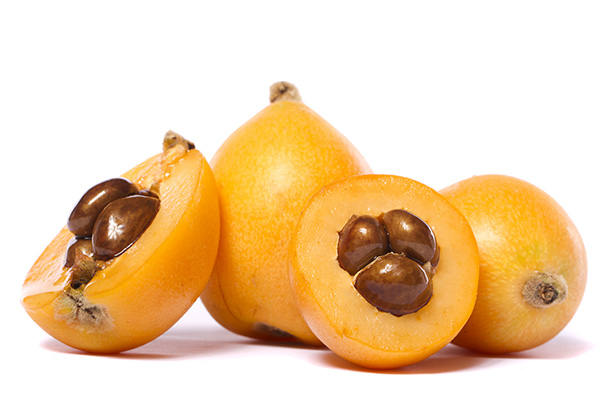
The loquat is a native of the rainforests of
southeastern China, from where it branched out to Japan, across Europe,
and to the Americas. It's possible to walk down a Southern California
street and see the beautiful, bush-like evergreens. Loquats, like
apples, strawberries, and pears, are members of the rose family
(Rosaceae). The fruit goes by a number of names, including Japanese
plums, Japanese medlars, nisperos, and Maltese plums. The juicy, sweet
(with a touch of tang) fruit is not only tasty, it is full of nutrients
and other beneficial ingredients.
Loquats pack quite a nutritional punch for one small fruit.
Loquats are full of both omega 3 and omega 6 fatty
acids. These monounsaturated fats are good for the heart and also keep
brain function at an optimum level.
Loquat leaves are a major weapon in the arsenal against adult-onset, or type 2, diabetes. The tormentic acid in loquat leaves boosts insulin production, while loquat leaf extract lowers glucose levels. (Wang, Z., Wang, W., and Chan, P. Treating type 2 diabetes mellitus with traditional Chinese and Indian medicinal herbs. Evidence-Based Complementary Alternative Medicine 2013, 17 pages)
The leaves are powerful cholesterol-reducing and antioxidant agents. What’s more, the foliage is a demonstrated liver-function booster and a proven cancer-fighter. Oral and breast tumors are two types that are responsive to loquat leaf extract. In addition, this extract is antiviral, thanks to its phytochemicals; even HIV is susceptible.
Nutritional Content
Vitamins
One large fruit provides 6% of the recommended daily allowance of Vitamin A , and a cupful contains more than half of an adult’s requirement. Vitamin A is the secret to healthy skin, mucous membranes, and eyes. Most of the B Vitamins complex is found in loquats. They are, in particular, a good source of vitamin B6.Minerals
Loquats contain iron, copper, calcium, manganese, and potassium. The first two minerals are essential for red blood cell formation. Calcium and manganese are vital for bone strength. Potassium is a powerhouse that lowers blood pressure (thereby preventing strokes), relieves headaches and colic, and benefits arthritis, colitis, Alzheimer’s, muscular dystrophy, and chronic fatigue syndrome patients.Antioxidants
Flavonoid antioxidants are found in abundance. Chlorogenic acid, one type of these oxygen-free-radical busters, is more strongly concentrated in ripe fruits. Among the benefits are a reduced likelihood of high blood pressure, certain eye diseases, heart problems, and some types of cancer.The Omegas
Dietary Fiber
Pectin, an insoluble dietary fiber, is a natural laxative which works by keeping moisture in the colon. Toxic substances are thus removed before they can damage the colon’s mucous membrane. What’s more, there is less time for this organ to bind with substances that can cause cancer. In addition, pectin lessens the rate of cholesterol’s reabsorption in the colon, which benefits those whose blood cholesterol is too high. Dietary fiber also plays an important role in weight loss. Loquats are extremely low in calories, fewer than 10 in each piece of fruit.Loquat Leaves
Lush, dark green foliage makes the loquat tree a thing of beauty. The leaves provide many benefits to health and well-being. Even more than the fruit, the loquat tree’s greenery provides protection and relief from numerous disorders.Loquat leaves are a major weapon in the arsenal against adult-onset, or type 2, diabetes. The tormentic acid in loquat leaves boosts insulin production, while loquat leaf extract lowers glucose levels. (Wang, Z., Wang, W., and Chan, P. Treating type 2 diabetes mellitus with traditional Chinese and Indian medicinal herbs. Evidence-Based Complementary Alternative Medicine 2013, 17 pages)
The leaves are powerful cholesterol-reducing and antioxidant agents. What’s more, the foliage is a demonstrated liver-function booster and a proven cancer-fighter. Oral and breast tumors are two types that are responsive to loquat leaf extract. In addition, this extract is antiviral, thanks to its phytochemicals; even HIV is susceptible.
Anti-spasmodic
The leaves are also an effective anti-spasmodic, which is beneficial to pregnant women afflicted by morning sickness. A tonic made by boiling the leaves is a thirst-quencher and a guard against sunstroke. The therapeutic benefits of this solution extend to treatment of various types of wounds. (Singh, B et. al. Pharmacological potential of Eriobotrya japonica: an overview. International Research Journal of Pharmacy 2010;1:95-99 and Kim, M et al. Loquat (Eriobotrya japonica) extracts suppress the adhesion, migration and invasion of human breast cancer cell line. Nutritional Research and Practice 2009:4(259-264)Reduces inflammation
Another effect of the extract of these remarkable leaves is of far-reaching benefit. Patients living with the autoimmune disorders rheumatoid arthritis, multiple sclerosis, Crohn’s disease, and other diseases in which inflammation plays a role find relief from their symptoms. In addition, the progression of the maladies themselves may be positively affected. (Prasad, P. et. al. Age-Associated chronic diseases require age-old medicine: role of chronic inflammation. Preventive Medicine 2012;54:S29-S37.)http://www.herbwisdom.com/herb-loquat.html
Click Here For More Articles

No comments:
Post a Comment